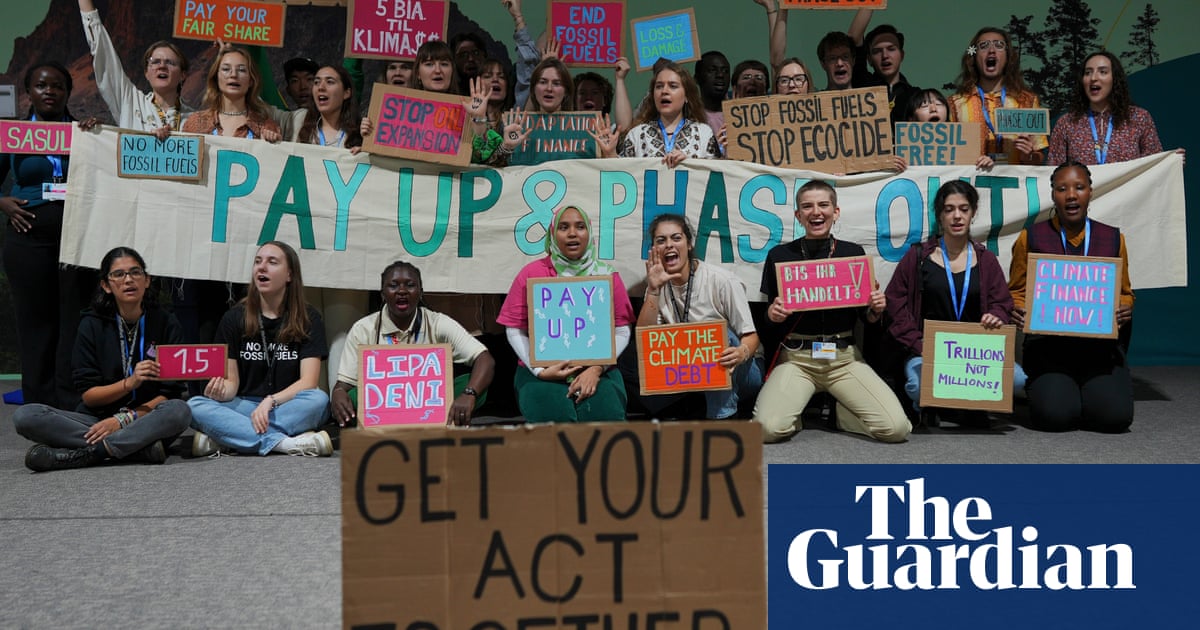The UN climate talks in Azerbaijan, scheduled to finish Friday local time, are dragging into the weekend as delegates from nearly 200 countries struggle to reach a consensus on the key issues being debated: a new global climate finance goal and what needs to be done about fossil fuels.
But what is happening in Baku matters, no matter how frustrating a process and inadequate an outcome it may seem. Here are five things you need to know about it.
Donât believe the hype
Cynicism is easy and, when it comes to climate summits, often warranted. They draw tens of thousands of delegates from across the globe to schmooze, monitor, lobby and protest. The talks seem routinely mired in disagreement. News media play a role in amplifying this – conflict rates and nuanced compromise is boring.
The headline stuff isnât great. Wealthy nations responsible for most historic emissions have mostly not acted on the scale necessary. China often seems publicly indifferent about the process despite having a huge presence â a team of more than 1,000 â and continuing to build renewable energy at a historically staggering rate. Saudi Arabiaâs pro-fossil fuel obstructionism is so blatant it now says the quiet bit out loud. More than 1,700 fossil fuel lobbyists turned up alongside a huge presence from clean energy and climate solution interests.
Meanwhile, global greenhouse gas emissions are yet to start coming down, rising an expected 0.8% this year, the planet is racing towards 1.5C of heating in little more than a century, and worsening extreme weather and heatwaves are taking a heavy toll on lives, livelihoods and nature.
Despite all this, UN climate talks still matter â and will continue to even as Donald Trump pulls out, and even though the system is inefficient.
Those who argue the talks are inconsequential or, as one commentator claimed this week, âa cynical exercise in moral blackmail against the westâ, might want to listen a bit more closely to people from the Pacific, the Caribbean and Africa. They argue forcefully that the UN climate process is their chance to have a voice and pressure for action on an issue that, for them, is a matter of life and death.
The UN talks have made a difference. Analyses found the landmark 2015 Paris agreement – and the national policies and commitments that followed â reduced the expected heating this century, sending a signal to major investors that led to a sharp increase in renewable energy. Last yearâs consensus in Dubai that the world needs to transition away from fossil fuels was a further push in that direction.
It didnât mean fossil fuel development stopped, as Australians well know. But it helps set a direction that is building momentum, in part because it now makes clear economic sense.
Climate finance is not charity
The big issue on the table in Baku is climate finance (it has been billed as the âfinance Copâ). Countries are aiming for a deal on a ânew collective quantified goal on climate financeâ, or NCQG. Australiaâs climate change minister, Chris Bowen, has been a co-facilitator of what has been a deeply challenging negotiation.
The short version is that the wealthy need to pay to help developing countries build clean economies, adapt to inevitable change and repair the escalating damage from climate breakdown.
This is not charity. The global community has agreed that those most responsible for the CO2 pollution fuelling worsening extreme weather have a responsibility to those who have emitted comparatively little, and in some cases virtually nothing. You broke it, you do whatâs possible to fix it.
As always, there is a fight over who should contribute â and how much. Everyone agrees that rich nations need to stump up much more than they have in the past, but not how much. Australia, along with others, has not nominated a figure, though Bowen did announce A$50m for a loss and damage fund to help the most vulnerable.
Not everyone agrees on the level of responsibility of countries that were classed as developing nations in the 1990s but are now among the biggest emitters â not just China, but the gulf states.
There has been an argument over what other sources of finance could be called on beyond public government funding. Plans include multilateral development banks, new taxes on emitting practices such as shipping and aviation, and private sector investment â though quite how that could be guaranteed is unclear.
Finally, there is the sum. An expert group of senior economists suggested a goal of up to US$1tn a year by 2030 and US$1.3tn by 2035. Campaign groups say it should be US$5tn based on the historic responsibility of developed countries, and that would be easily achievable if fossil fuels were taxed properly.
It is unclear whether this will be resolved in Azerbaijan. A draft deal released by the Azeri hosts late on Friday set a central goal of US$250bn a year by 2035 and a wider target of at least $1.3tn. Some countries responded angrily.
A Cop31 bid stuck in neutral
The Australian government had high hopes of leaving Baku with the rights to host the Cop31 climate summit in 2026 in partnership with Pacific countries. It hasnât happened yet. While it has a clear majority of support among the Western European and Others group of nations that decides the venue, Turkey remains in the race, and it is a consensus process.
Concerted efforts by the Australians, Pacific leaders and others to convince the Turkish to withdraw – including a pointed public call from Bowen, who told the Guardian that âitâs timeâ for a southern hemisphere Cop after a decade in the northern hemisphere – have not been enough.
It is unclear when the issue will be resolved. It could drag on until Cop30 in Belem, Brazil next November.
One leader keen for it to be resolved is the South Australian premier, Peter Malinauskas, who is campaigning to host the event in Adelaide and flew to Baku to get a state of Cop-life and turn on the charm. With his tongue only slightly in his cheek, he told an Australian gathering that if the country did finally secure the rights he had âabsolutely no doubtâ the federal government would âprioritise a place with good wine and Haighâs Chocolatesâ over, say, Sydney or Brisbane.
Nuclear is not really back
Some media outlets went to great lengths this week to claim that nuclear energy was at the centre of Cop29 talks, and Bowen had been embarrassed by Australia not signing up to a UK-US civil nuclear deal.
Take it from a reporter on the ground: this has no basis in fact.
The UK made a mistake by listing on a press release Australia and another nine countries that it said it expected would sign up to a Generation IV International Forum on nuclear. That sentence were quickly removed once it was pointed out that no one had checked and it wasnât true. Instead, Australia will continue as an observer, as it was in the forumâs previous iteration.
The slip-up had no obvious impact on the relationship between the countries â Bowen and his UK counterpart, Ed Miliband, held an event to sign a renewable energy agreement shortly after the story broke. And nuclear has been barely visible as an issue at the talks.Â
Thirty-one countries have signed up to a side pledge to triple nuclear power capacity by 2050, with six new countries joining at Cop29. But the global focus is renewable energy. Cop28 agreed global investment in renewables needs to be tripled by 2030, and the bulk of the non-fossil energy investment is going that way.
Only one country that signed the pledge to triple nuclear, Slovakia, has started work on planning a new plant in the past year. And those plants take about 20 years to build.
The world is here – for good and bad
At a time of global disruption, UN climate summits are a remarkable collection of people from across the planet. Thatâs no a bad thing, though views on who should be welcomed differ.
The Taliban have been here. So have representatives from both Israel and Palestine.
There were at least 10 ministers from the Pacific on the ground in the final week, and several presidents and prime ministers turning up for the leadersâ section (something Anthony Albanese is yet to do since becoming PM).
The Biden administration is here, led by Bill Clintonâs former chief-of-staff John Podesta, but more subdued than previous years. Representatives for Donald Trump â not yet president, definitely not interested in working to address the climate crisis â are not. His election was discussed and will clearly have an impact, but has not been the black cloud some expected.
Argentina was here despite its president, Trumpâs ally Javier Milei, blustering about pulling his country out of the Paris agreement. Perhaps the risk of companies cutting off clean energy investment means more than ideology.
There were advocates for every energy source going, but particularly solar and wind. Malcolm Turnbull attended on behalf of the International Hydropower Association and Matt Kean for the Climate Change Authority. Climate denying senator Ralph Babet showed up briefly, paid for by the nuclear spruiking Coalition for Conservation.
Russia had a major visual presence despite saying little publicly during the talks. Some of its outreach was focused on the young – visitors to its pavilion were offered an âecological colouring book for childrenâ produced by the Russian majority state-owned gas company Gazprom.
Ukraineâs pavilion told a much more powerful story. Its striking white walls, made of recycled paper and living seeds, detailed the devastating impact of Russiaâs invasion on its environment, including 14 documented cases of ecocide and an estimated cost of US$71bn. Nearly 900sq km of Ukraine forest have burned, six of the countryâs nuclear reactors are occupied, and last yearâs destruction of the Kahovka hydroelectric dam released enough to hydrate the world for two days.
But the overarching message on Ukraineâs pavilion walls was one of resilience – that âdespite Russian terror, which is jeopardising the ecosystems, energy and food security of the whole world, Ukraine remains a reliable partner in achieving global climate goalsâ.
Even in unlikely places, the effort pushes on.



